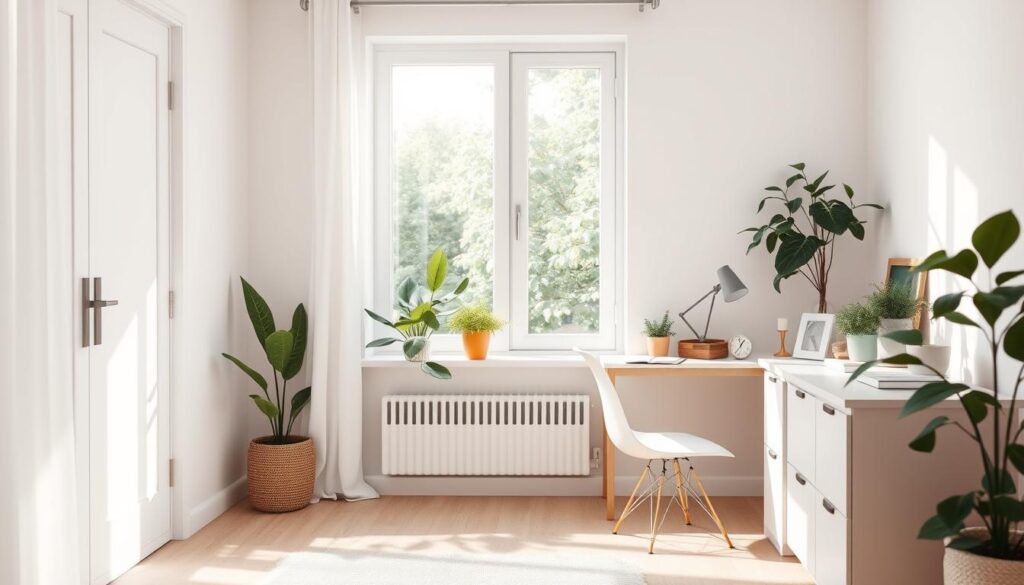7 Affordable Self-Care Tips to Boost Mental Health
Are you finding it hard to focus on your mental health without spending a lot? What if I told you that you don’t need to break the bank for a better life?
In today’s world, taking care of yourself is more important than ever. Your mental health is key to feeling happy, productive, and fulfilled. The best part? You can start 7 simple self-care habits at home that won’t cost much!
Frugal wellness tips are about smart spending on yourself. These affordable routines can help you handle stress, build emotional strength, and make lasting changes in your life.
Key Takeaways
- Mental health can be improved through budget-friendly strategies
- Self-care doesn’t require expensive interventions
- Small, consistent practices can significantly impact well-being
- Holistic approaches address emotional and physical health
- Everyone can develop personalized self-care routines
Understanding Mental Health and Self-Care Basics

Mental health is more than just staying healthy. It’s about living a balanced life that supports your mind and emotions. Finding ways to reduce stress without spending a lot is key to staying well!
Defining Mental Well-being
Mental well-being is not just feeling happy. It also means:
- Emotional stability and regulation
- Psychological resilience
- Ability to manage life’s challenges
- Maintaining positive social connections
The Connection Between Self-Care and Mental Health
Low-cost mental health tips are great for your mind. Simple mindfulness practices can change how we feel and handle stress.
“Self-care is not selfish. You cannot serve from an empty vessel.” – Eleanor Brown
Why Affordable Solutions Matter
Not everyone can afford expensive therapy. The good news? You can get help without spending a lot. Simple, low-cost actions can greatly improve your mood.
- Meditation reduces stress hormones
- Nature exposure boosts mood
- Regular exercise enhances mental clarity
- Proper sleep supports emotional balance
By using affordable self-care, you can improve your mental health without spending a lot!
Mental Health Benefits of Simplifying Your Life

Life can feel like a complex puzzle. But, simplifying your world might unlock mental peace! Using economical relaxation techniques can change your daily life and reduce stress in big ways.
Let’s see how low-cost strategies can make your life more serene:
- Reduce physical clutter to create mental space
- Minimize unnecessary commitments
- Practice intentional living
Thrifty emotional well-being starts with knowing what’s important. Tracking your time and spending can show ways to simplify. Studies show people who check their activities find ways to cut stress.
“Simplicity is the ultimate sophistication” – Leonardo da Vinci
Here are some simple steps to simplify:
- Do a weekly time audit
- Focus on meaningful activities
- Make digital-free zones
- Practice gratitude every day
Dr. Laurie Santos says strong social ties are key to happiness. Simplifying your life makes room for meaningful relationships. This doesn’t just save money; it makes your emotional life richer!
Simplifying isn’t about giving up. It’s about living a life that feels lighter, more meaningful, and fulfilling. Your mental health will be grateful!
7 Simple Self-Care Practices That Save Money and Boost Mental Health
Looking after your mental health doesn’t have to cost a lot. I’ve found some amazing ways to improve your mood without spending a lot. Here are seven easy self-care tips that won’t empty your wallet.
Mental health is very important, and these 7 simple self-care practices can really help. They show that you don’t need to spend a lot on wellness. You can take care of your mind without breaking the bank.
- Mindful Breathing: A free technique that instantly calms your nervous system
- Nature Connection: Spending time outdoors reduces stress dramatically
- Journaling: Your personal emotional release strategy
- Hydration: A simple way to support mental clarity
- Digital Detox: Creating boundaries with technology
- Home Workouts: Budget-friendly physical activity
- Meal Prepping: Reducing stress through smart nutrition
“The best self-care doesn’t cost money – it costs intention.” – Mental Health Expert
The American Psychological Association says that mindful breathing and nature therapy can really lower stress. Just 10-15 minutes of mindfulness each day can make a big difference in your mental health!
What’s great about these self-care tips is how simple they are. You don’t need to join expensive gyms or go to therapy. These practices are easy to do and can start making a difference right away!
Remember, self-care is essential, not a luxury. By adding these frugal wellness tips to your daily life, you’ll be on the path to better mental health for good!
Mindful Breathing and Gentle Stretching: Your Cost-Free Morning Routine
Start your day with simple yet powerful mindfulness practices. These can change your morning routine for the better. Imagine waking up feeling calm and ready to face the day with energy.
Benefits of Morning Mindfulness
Morning mindfulness is more than a trend. It’s a way to improve your mental health. Just 10-15 minutes of relaxation can:
- Reduce stress levels dramatically
- Improve mental clarity
- Boost emotional regulation
- Enhance overall well-being
Simple Stretching Exercises for Mental Clarity
These tips for wellness don’t need any special equipment or a lot of space. Try these easy morning stretches:
- Cat-Cow Stretch: Makes your spine flexible and relieves tension
- Standing Forward Bend: Boosts blood flow and calms your mind
- Seated Twist: Relaxes your back and helps digestion
“Your morning sets the tone for the entire day. Make it count!” – Unknown
Creating a Sustainable Morning Practice
Being consistent is important for your mindfulness routine. Even 5 minutes can help. Pick a time that fits your schedule and grow your practice slowly. Remember, it’s about doing it your way!
Pro tip: Keep your stretching area tidy and comfy. This will help you stay motivated and enjoy your practice!
Nature Therapy: Harnessing the Healing Power of Outdoors
Imagine a way to reduce stress that’s free! Nature therapy is a budget-friendly mental health hack. It can change how you feel. Studies show that being outside is a cheap way to improve your mood.
“Nature does not hurry, yet everything is accomplished.” – Lao Tzu
Americans spend most of their time indoors, missing out on mental health benefits. Being in nature can refresh your mind and body. Even a short time outside can make you feel better and less stressed.
- Reduce stress and anxiety through outdoor activities
- Improve cognitive function with natural environments
- Boost immune system through nature exposure
- Enhance overall mental well-being without expensive treatments
Simple outdoor activities can make a big difference. A walk in a park, gardening, or sitting by trees can help your mental health. Nature doesn’t charge an hourly rate for healing!
For city folks with little green space, small nature interactions can be big. Potted plants, community gardens, or quick park visits can help a lot.
Nature therapy isn’t about grand adventures—it’s about meaningful connections with the world around us.
By using nature as therapy, you find a cheap way to improve your mental health. It connects you with the world’s best healing force.
Journaling for Emotional Release and Self-Discovery
Discover the power of journaling for low-cost anxiety management. It’s a secret tool for emotional healing and self-understanding. All you need is a pen, paper, or a digital app.
Getting Started with Therapeutic Writing
Starting to journal might seem hard, but it’s easy! Here are some tips to begin your mindfulness practice:
- Choose a journal that feels comfortable and inviting
- Set aside 5-10 minutes daily for writing
- Create a quiet, peaceful space for reflection
- Don’t worry about perfect grammar or structure
Journaling Prompts for Mental Health
Need inspiration? Try these powerful prompts to start your emotional journey:
- What emotions am I experiencing right now?
- List three things I’m grateful for today
- Describe a challenge I’m currently facing
- Write about a personal strength I’m proud of
“Journaling is like whispering to yourself and listening at the same time.” – Marilyn Bader
Tracking Emotional Patterns
Regular journaling lets you explore your emotions. By writing down your thoughts and feelings, you’ll spot patterns and growth areas. This self-awareness is key for managing anxiety and improving mental health!
Remember, journaling is personal. Your way is the right way. Enjoy it, and see how it changes your mental health journey!
Nourishing Body and Mind Through Proper Hydration and Nutrition
Fueling your body with the right nutrients is a powerful frugal wellness tip. It can transform your mental health! Proper hydration and nutrition are secret weapons in your cost-effective stress relief toolkit. Let’s dive into how simple dietary choices can boost your emotional well-being without breaking the bank.
Water is your mental health’s best friend. Staying hydrated isn’t just about quenching thirst. It’s a thrifty emotional well-being strategy that can dramatically improve your mood. Aim for eight cups of water daily to keep your brain functioning at its best.
- Choose water over sugary drinks
- Limit caffeine intake
- Eat water-rich foods like cucumbers and watermelon
“Let food be thy medicine and medicine be thy food.” – Hippocrates
Nutrition plays a key role in mental wellness. Budget-friendly foods can pack a powerful punch for your emotional health. Focus on these wallet-friendly, nutrient-dense options:
- Eggs for protein and mood-boosting nutrients
- Greek yogurt for gut health
- Frozen vegetables for convenient nutrition
- Seasonal produce to save money
Pro tip: Cooking at home is not just a cost-effective stress relief method. It’s also linked to better diet quality and improved mental health. Meal prepping can help you eat nutritiously while keeping your budget in check!
Remember, nourishing your body doesn’t have to be expensive. Small, consistent choices can lead to significant improvements in your mental and physical well-being.
Creating Digital-Free Zones for Mental Peace
In today’s world, too much tech can wear us down. Did you know 85% of people think setting tech-free zones at home is key? These digital limits are simple yet powerful ways to change your day!
People check their phones over 150 times a day. This constant checking is like mental noise. You don’t need to spend a lot to relax – just disconnect from screens!
Setting Healthy Boundaries with Technology
Setting up affordable self-care means setting digital limits. Here are some easy steps:
- Make sure to have device-free hours every day
- Put your chargers in a spot away from your bedroom
- Use airplane mode when you need some alone time
- Limit how long you use apps on your phone
Alternative Activities for Screen-Free Time
“Disconnect to reconnect with yourself” – Digital Wellness Mantra
Instead of screens, try activities that are good for your mind:
- Read a real book
- Try meditation
- Do something creative
- Talk to someone face-to-face
Building a Sustainable Digital Wellness Routine
Changing how you use tech takes time. Start small and stick to it. You’ll see your mind clear up! And remember, 76% of people want to take care of their mental health on their own.
Movement and Exercise: Budget-Friendly Physical Activities
Find out how movement can boost your mental health without spending a lot. Physical activity is a great way to reduce stress and feel better without breaking the bank.
Exercise doesn’t need to be expensive. Your body is the most affordable workout tool you’ll ever own! Simple activities can greatly improve your mental health:
- Walking in neighborhood parks
- Home workout routines using bodyweight
- Community sports groups
- YouTube fitness channels
- Dancing in your living room
“Movement is medicine for creating change in a person’s physical, emotional, and mental states.” – Carol Welch
Studies show that 30 minutes of daily movement can cut down anxiety and improve focus. A 2019 study found that spending time in urban parks boosted well-being for over 50% of people. This shows that you can manage anxiety without spending a lot!
Pro tip for frugal wellness: Keep your routine fresh. Try free community fitness classes, explore hiking trails, or join online workout communities with no cost!
Remember, it’s the regular movement that counts, not how hard you’re working. Your mental health will appreciate it if you make exercise a regular part of your self-care routine!
Meal Prep to Save Money and Reduce Stress
Meal prep is a great way to save money and feel better. It’s not just about cutting costs. It’s also a way to take care of yourself.
“Meal prepping is like giving your future self a delicious, stress-free gift!” – Wellness Expert
Here’s why meal prep is good for your mind and wallet:
- Reduces daily decision fatigue
- Saves money by preventing impulse food purchases
- Ensures nutritious eating
- Creates a sense of control and accomplishment
Starting meal prep can take just 10-15 minutes a week. Here are some quick tips:
- Plan your meals around whole foods
- Shop with a detailed grocery list
- Buy ingredients in bulk when possible
- Prep containers for easy portioning
Pro tip: Choose stress-reducing foods like dark leafy greens, fatty fish, and complex carbohydrates that naturally support emotional balance! By adding these foods to your meal prep, you’re doing more than saving money. You’re also boosting your mental health.
Studies show that meal prep lowers stress and improves nutrition. It’s a smart choice for your wallet and your well-being!
Conclusion
Starting simple self-care practices that save money and boost mental health is easy. Small, consistent steps can lead to big changes in how we feel. By using frugal wellness tips, you can improve your mental health without spending a lot.
Begin with simple steps like mindful breathing, going for walks in nature, and making digital-free zones. These methods have been shown to lower stress, lift your mood, and make you more resilient. The most important thing is to be consistent and kind to yourself.
It’s okay to ask for help. Whether it’s through online connections, meditation apps, or short therapy sessions, taking care of your mind is key. Every small step you take brings you closer to a happier, more balanced life. Start now, be gentle with yourself, and see how these simple steps can change your life.
Your journey to better mental health is special and worth it. By choosing self-care that’s easy on your wallet, you’re not just getting by – you’re thriving! Keep exploring, learning, and caring for your inner self.






